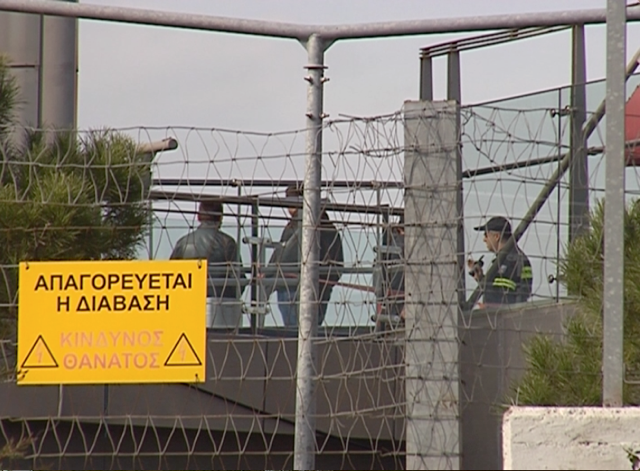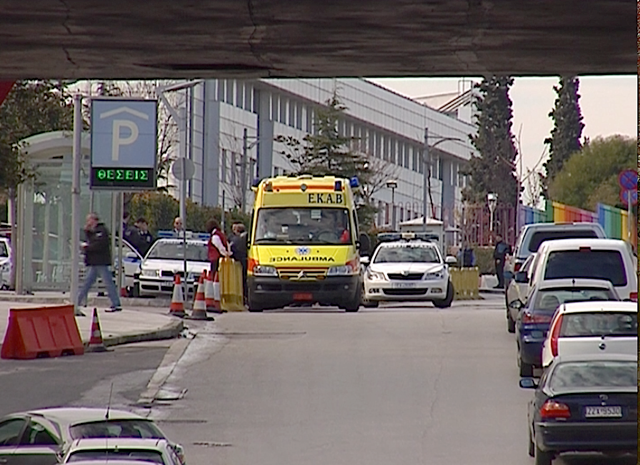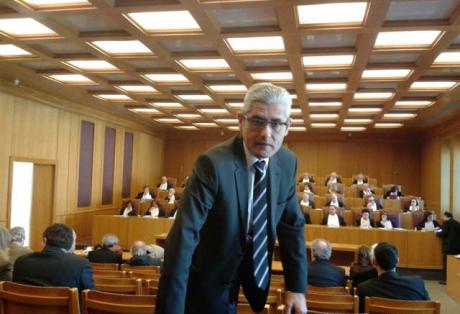Photos: Vassilis Vafidis
Anastasia Balezdrova
At least four people put the bomb in "The Mall Athens" shopping centre as concluded by the members of the anti-terrorism forces after checking the video recorded by the security cameras. According to sources, hoods and caps hid the faces of the attackers.
Therefore, anti-terrorists have been examining their silhouettes in order to establish the existence of similarities with persons who had been captured by security cameras in other terrorist attacks. At the same time, authorities believe that the participants in yesterday's attack were more than the four persons, who were detected in it.
On the other hand, the type of explosive device "points" to the "Conspiracy of Fire Nuclei" terrorist group, which became famous for sending parcel bombs in November 2010. The bomb that exploded yesterday was made of gelatine dynamite, probably mixed with a small quantity of ammonium nitrate mixed with motor oil (ANFO). The explosive had a switch button and was placed in a pressure cooker.
So far, no organisation has assumed responsibility for the attack. The police say that even if the name of the organisation were new, members of old groups would actually be hiding behind it.

Earlier today, New Democracy deputy Kyriakos Mitsotakis expressed his concern over the fact that judicial authorities were particularly slow in hearing cases involving terrorist attacks. This leads to the expiration of the 18-month period of detention, after which the persons captured for involvement in such groups are exempt. "My confidence in the judiciary is not the same as in the leadership of the Ministry of Citizen Protection... I am saying this because it is not possible for 18 months to pass without examing such a serious case and with those accused of involvement in "Revolutionary Struggle" like Nikos Maziotis and Paula Roupa being able to walk freely today," he said.
The attack caused a commotion not only in Greece. The State Department of the United States issued a warning to any of its citizens who are planning to visit or live in Greece.
It describes yesterday's attack stating how it wounded two security guards of the shopping centre and how no organisation has assumed responsibility. The State Department warns U.S. citizens to be very careful during their stay in Greece. In addition, it recommends that they should be included in a special programme of the Department through which its members will be able to contact them through the embassy or consulate of the United States in case of emergency.

GRReporter turned for comment to expert in criminology and criminal policy, Angelos Tsigris.
Do you think that the bomb attack yesterday shows a change in the tactics of terrorist organisations? The older generation of groups organised bombings and attempts on the lives of specific individuals while yesterday's bomb could have resulted in any number of casual victims.
"We can be sure of one thing and it is that terrorism in Greece is not over. It is active and passes from one generation to the next. In practice, after the restoration of democracy in the country, it has never "rested" from this phenomenon.
Every age has its crime, violence and terrorism, which are the products of the specific social structure or group. That is to say, terrorism as a phenomenon develops as societies themselves develop. Terrorism today is quite different from that which laid the foundations of the phenomenon decades ago."

Are the measures and actions of anti-terror forces adequate and effective? According to them, the bomb attack yesterday involved four people at least. They were able to enter, put the bomb and leave without being noticed by anyone. What is your comment?
"The measures are not effective. There is the following unique contradiction in Greece: although all the reasons that give rise to violence, terrorism, crime and lawlessness in general are present, the competent authorities do not have the ability to deal with this problem with a rational penal policy, a stable, long-term and targeted policy that will examine and reconsider these goals.
To be more specific, I would say that there are gaps in prevention in Greece, which is nothing more than a diagnosis of the causes of the phenomenon and the resulting interference to remove them. There are, however, serious problems in terms of the direct measures against such phenomena. While crime, violence and terrorism are developing and galloping at high speed, public policy and security are in practice regressing. As a result, the distance between violence and official public order is increasingly growing. An example of this is the lack of equipment and adequate training of the police. A large number of policemen retire and new ones are not expected to be appointed in the next two years. At the same time, the staff in many police stations is being reduced while other police stations are being directly closed because of the establishment of new services such as the detention centres for immigrants. All these facts show that Greece is not rationally considering tackling terrorism, even in relation to operating activities.